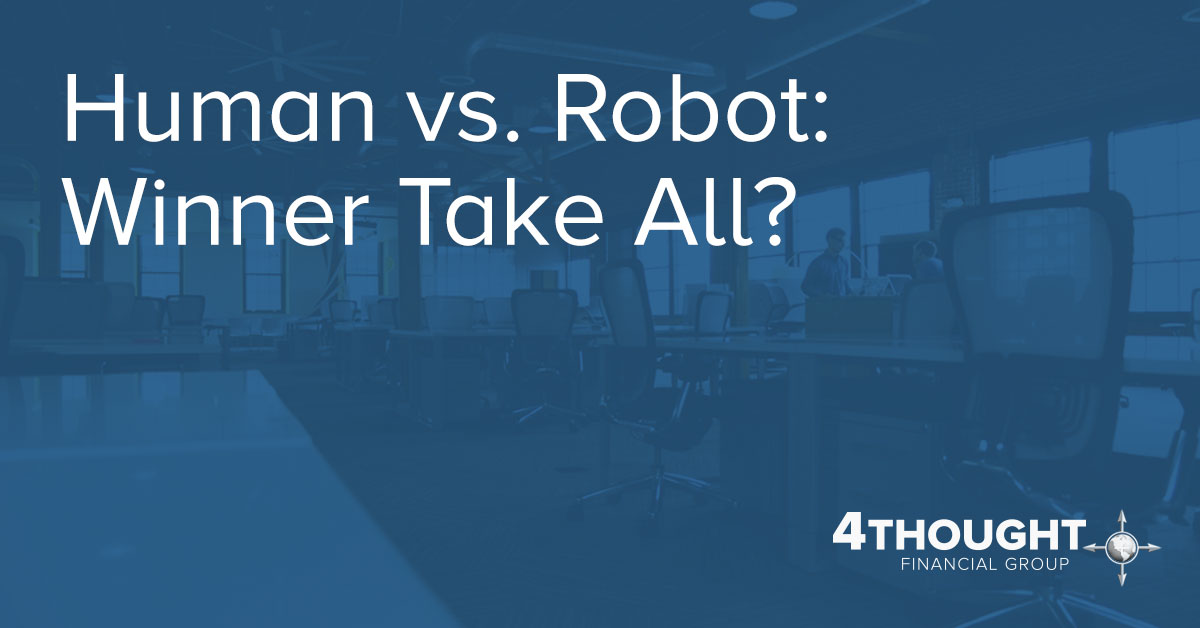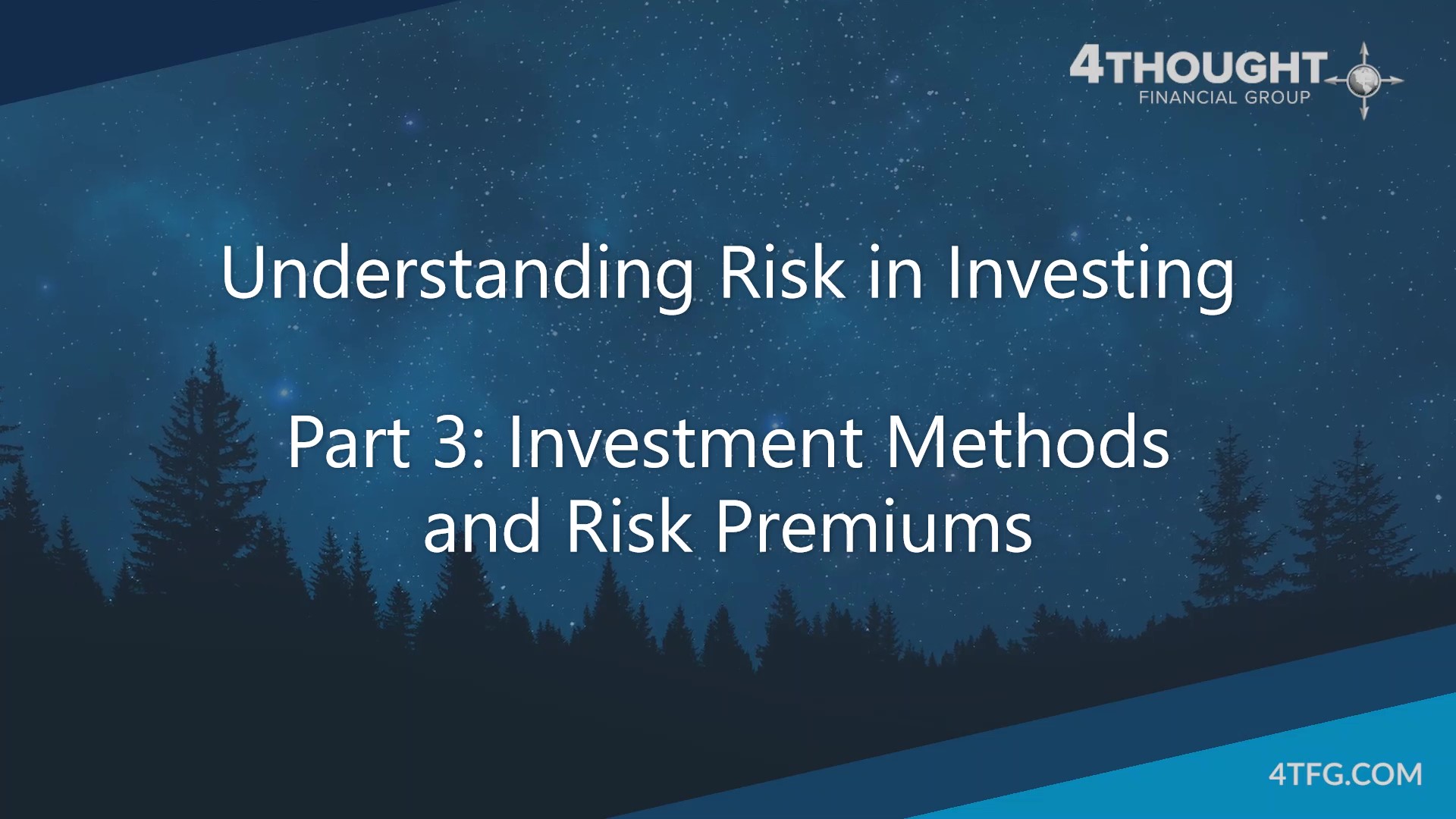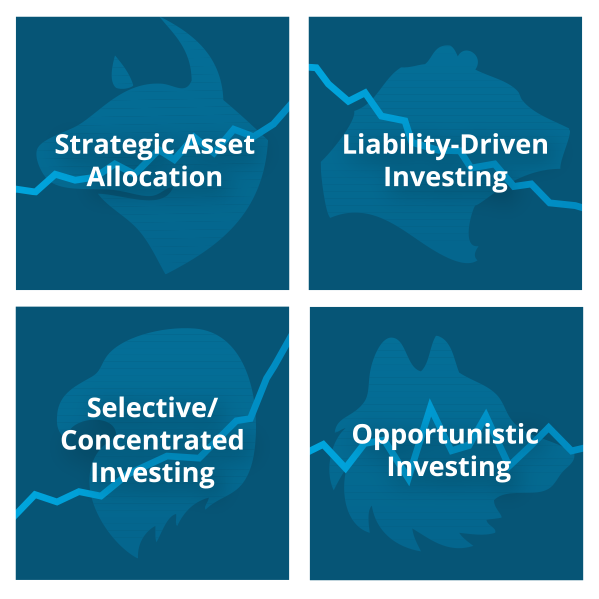
Human vs. Robot: Winner Take All?
Nope (at least not for a while).There is a big discussion in the investment management and financial planning world about the disruptive impact of technological advances on the industry, and in particular, the possibility of the “robo-advisor” supplanting the traditional human advisor as the primary deliverer of financial services to the end user. For the unfamiliar, robo-advisor is the preferred term of the financial media to describe a variety of digitally-delivered online services that leverage technology to attempt to automate the bulk of (if not all of) the investment advisory services process for retail investors, and in some cases parts of the fee financial planning process. These services purport to provide a low-cost technology-dependent approach to personal financial life, with the early adopters having primarily come from the millennial demographic cohort.
With various permutations of the robo-advisor idea coming first from venture capital backed independent firms, and now from some of the big traditional custodians, the teeming hordes of human traditional financial advisors are left wondering how this will impact their roles and their livelihoods. The reactions of human advisors seem to fall primarily in the range of denial to fear. Advisors have good reason to be fearful. Many of the Millennials and some Gen-X investors view the traditional advisor as a “middle man” that can be cut out of the transaction if they go direct to an automated online alternative. There are very few human advisors that are excited about this disruption in the way they’ve become accustomed to doing business. This dynamic needs to change, for the sake of both investors and advisors.
Many human advisors will need to evolve from their traditional business models if they want to remain relevant and profitable into the future. For an older Boomer generation advisor that intends to retire in the next few years, an attitude of denial about the upcoming impact on their business may be forgivable. But anyone that wants to remain in the industry for an extended period will need to avoid being a victim of technological progress, not by fighting it, but by embracing it. The supposed coming war of humans versus robots in the financial services industry is unlikely to be a winner-take-all event. Instead, it is more likely that the future of finance, just as in other industries, will reflect a merger of humans and robots. Advisors must emphasize the positive aspects of human thought that automation and artificial intelligence cannot provide and simultaneously “outsource” the aspects of their work that computers do better. They need to use technology as bolt-on prostheses for their brains and become like the bionic man.
The technological juggernaut progresses whether we want it to or not.
Taking a step back to look at the bigger picture of the historical economic relationship between man and machines can be enlightening in this discussion. Luddites (usually in the form of individual laborers) that refuse to accept the positive elements of technology and refuse to adapt to a changing environment have consistently ultimately become the victims of technological progress over time, despite all government attempts at intervention. This is a lesson of economic history. The technological juggernaut progresses whether we want it to or not. This is particularly true of capitalist societies, but is also largely true of virtually every other societal type, although perhaps to a lesser degree. The individual can choose to either jump into the driver seat of the technology steamroller or get steamrolled by it. Sidestepping it is not one of the options.
So if we can accept that change is coming, how do we adapt to it? Thinking from an economist’s viewpoint also provides answers to this question. Evolutionary biology helps too. One of the most interesting features of the human race is its ability to pre-empt the evolutionary process of natural selection through innovation and creativity. Most other members (if not all others) of the animal kingdom need to die, and through a random mutation in their offspring’s genetic code, produce a more suitable biology/behavior, in order to adapt to changes in their environment. Humans don’t necessarily have to die in order to change their behavior. We can think ahead and around corners in just about any circumstance or environment; we can innovate; and we can pre-emptively create solutions to anticipated problems. This means we can evolve our behavior without death – which gives us a tremendous advantage as a biological species. Just as we are superior to all other animals in this regard, we are also (at least currently) superior to all machines and artificial intelligence in the same way.
If we think of the roles that human beings can play as participants in our economy, there are basically four: The Creator, The Producer, The Trader, and The Consumer. Most people take on a little bit of each of these roles during their lifetimes, but also focus on only one of these in their profession. The angst associated with technological progress is largely due to the fact that computers, robots, and artificial intelligence can potentially replace human beings in their performance of these roles. This can provide insight. Robots can easily replace humans in many aspects of The Producer role in the example of manufacturing. Algorithms and automation can easily replace humans in many aspects of The Trader role in the examples of investment portfolio management or retail sales. Technology can even take on aspects of The Consumer role through the material maintenance needs of machinery or the consumption of data by computer programs. But the one area where human beings still maintain a major advantage over machine behavior is in the role of The Creator. This role may be the most important of all, as it is the progenitor of economic growth and the basis of our success as a species. It can be loosely defined as the generation of ideas, innovation, and the original creation of implementable solutions. Even the most advanced forms of artificial intelligence currently under development are still far behind human beings in this skill set. Although it is possible that rapid progress can be made in this area on the part of AI, it does not appear feasible that such progress will be enough to overtake the sheer versatility of human thought in the near term, if ever.
So on the plus side for all human beings, we have a comparative advantage over the robots in the form of creativity. The basic economics of Adam Smith therefore says that this task should be allocated to us, while many of the others tasks for the other three above-mentioned roles may be better allocated to technological automation in order to make our entire economy more efficient.
Focus on performing the high value-added tasks and developing those creative idea-oriented skills that computers cannot currently perform well...
This is a valuable lesson for any career-oriented person in any industry: Focus on performing the high value-added tasks and developing those creative idea-oriented skills that computers cannot currently perform well, and you will likely secure your spot in the global economy and never become an unemployed victim of technological progress. The lesson is to use the technology to automate all of the menial tasks to free up more time and resources to support you in your more creative pursuits.
If we apply this to the financial services, this leads to a few potential revelations for traditional human advisors who are looking to use the unique abilities of their species and adapt without having to “die”. Here are a few means of pre-emptive evolution that come to mind for the individual traditional advisor:
- Don’t spend a lot of your time (or your employees’ time) doing things that a computer can do faster, cheaper, and better. For example, many of the tasks of Modern Portfolio Theory based portfolio management can be automated.
- Do not base your fees purely on assets under management, unless you can prove to your clients over time that you are providing enough value through your contribution to the portfolio management process to justify those fees (which are likely to be much higher than the fees charged by a robo-advisor). If your fees are AUM-based and higher than a robo-advisor’s fees, you will need to be doing something unique and differentiated enough that a robo cannot do it (and you have to do it well) in order to charge a premium.
- Focus on providing high value services that a computer cannot do well, such as analyzing and providing highly tailored recommendations on issues related to complex financial planning and wealth management topics. Think estate planning, business succession planning, employer/employee benefits, and creative investment planning (not just cash flow projections like a software program).
- Charge directly for the services you provide, not indirectly. For example, if you are providing advice on complex issues related to comprehensive financial planning on an ongoing basis, charge a monthly or quarterly retainer financial planning fee instead of trying to get paid by elevating your fee on assets under management. This will clarify to your clients what you can do for them that a robo advisor cannot.
Optimality for us as a species lies in combining the best aspects of human thought with the best aspects of technological might. Treat technological advancements as enhancements and prostheses for your brain. Become bionic.







Leave a Comment